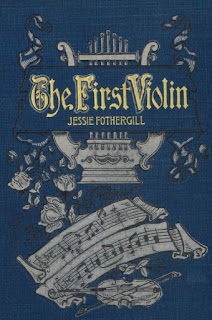 Original Publication Date: 1877
Original Publication Date: 1877Genre: Romance
Topics: love, music, friendship, honor, fatherhood, coming of age, mysterious past
Review by Rachel S:
In the pre-internet era, when out-of-print books were difficult to find, my grandma would tell me about the books that she loved when she was growing up. One of her favorites was First Violin by Jessie Fothergill. Of course nowadays this book, which seemed so impossible to locate when I was a child, is easy to access and completely free. I finally got around to reading it, and was very glad I did, because I thoroughly enjoyed it. If I had read it when I was a child or teenager, I can easily imagine it becoming one of my favorite books.
First Violin was originally published in 1877, and was quite popular in the late 19th and early 20th centuries. Although it is rather G-rated by today’s standards, it was apparently somewhat controversial at the time, because it describes (but does not condemn) an affair by a married woman. The main plot line follows a handsome violinist with a mysterious past, Eugen Courvoisier. Much of the tension in the book comes from slowly discovering his backstory.
The novel is narrated from the perspectives of May Wedderburn, an English girl who travels to Germany for musical training, and of Eugen’s friend Friedhelm Helfen, a fellow musician. Although several main plot threads involve romantic relationships, Eugen’s love for his son and his friendship with Friedhelm are also central to the story. The following passage from the beginning of the novel gives a sense of the book’s general style. May is distressed here because her malevolent, much older neighbor is pursuing her romantically:
“Shuddering, dismayed, I locked the matter up within my own breast, and wished with a longing that sometimes made me quite wretched that I could quit Skernford, my home, my life, which had lost zest for me, and was become a burden to me. The knowledge that Sir Peter admired me absolutely degraded me in my own eyes. I felt as if I could not hold up my head. I had spoken to no one of what had passed within me, and I trusted it had not been noticed; but all my joy was gone. It was as if I stood helpless while a noisome reptile coiled its folds around me.”
The prose tends towards melodrama, but May’s dismay and alarm here are not unreasonable given her situation. In general, although the book takes place in a world of heightened emotion, I found the characters’ reactions, descriptions, and conversations convincing.
Less believable are the improbable coincidences on which the plot hinges (several of which involve extreme weather). It’s probably better not to give spoilers, because part of the fun of the book is finding out how various suspenseful situations resolve. I’ll just say that events are configured for maximum drama in several emotionally tense scenes, and that the book includes multiple highly unlikely encounters that strain credibility.
Nevertheless, I found the book as a whole compelling, with memorable, although somewhat flat, characters. The story raises some interesting questions on the meaning of honor, with the married-woman-affair subplot, dishonorable but utterly sympathetic, providing a counterpoint to Eugen’s rigid acceptance of the constraints of duty. For the most part, though, it’s just a delightful read, one I didn’t want to put down until the very end.
Download The First Violin by Jesse Fothergill at Project Gutenberg|Librivox|GirleBooks|Internet Archive


